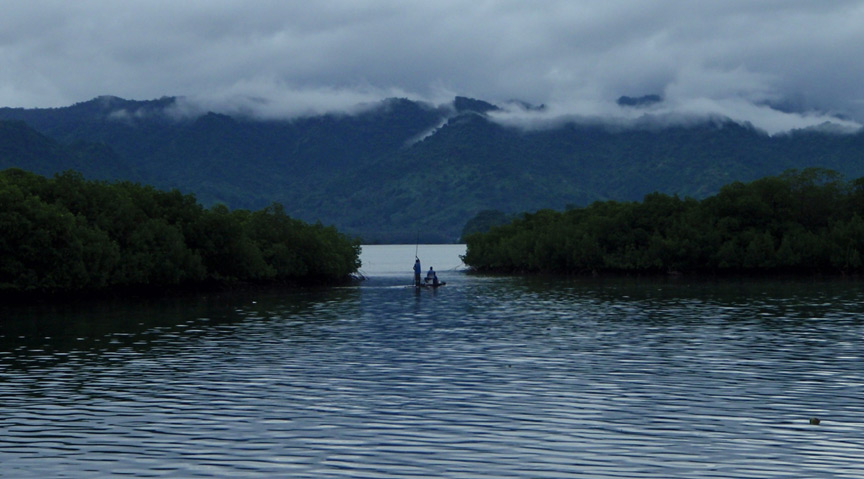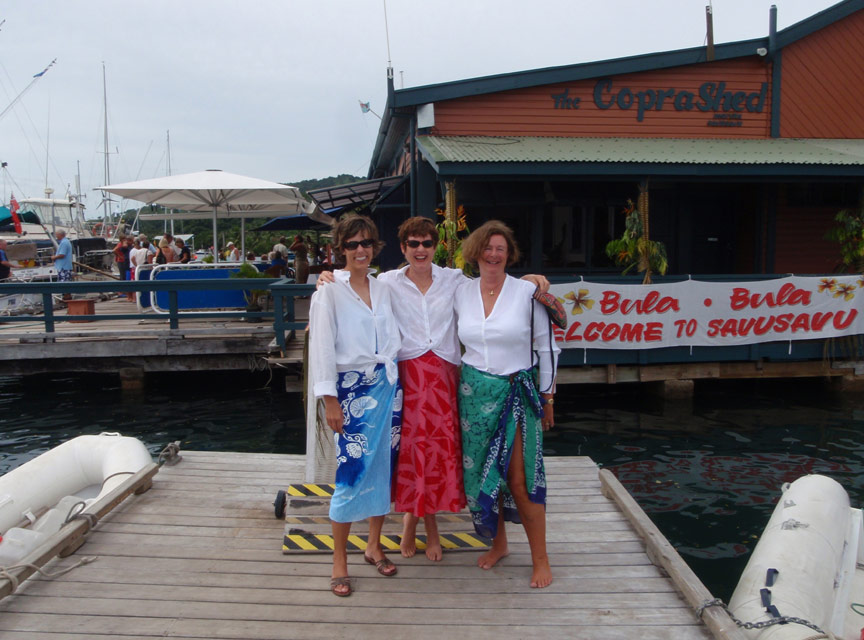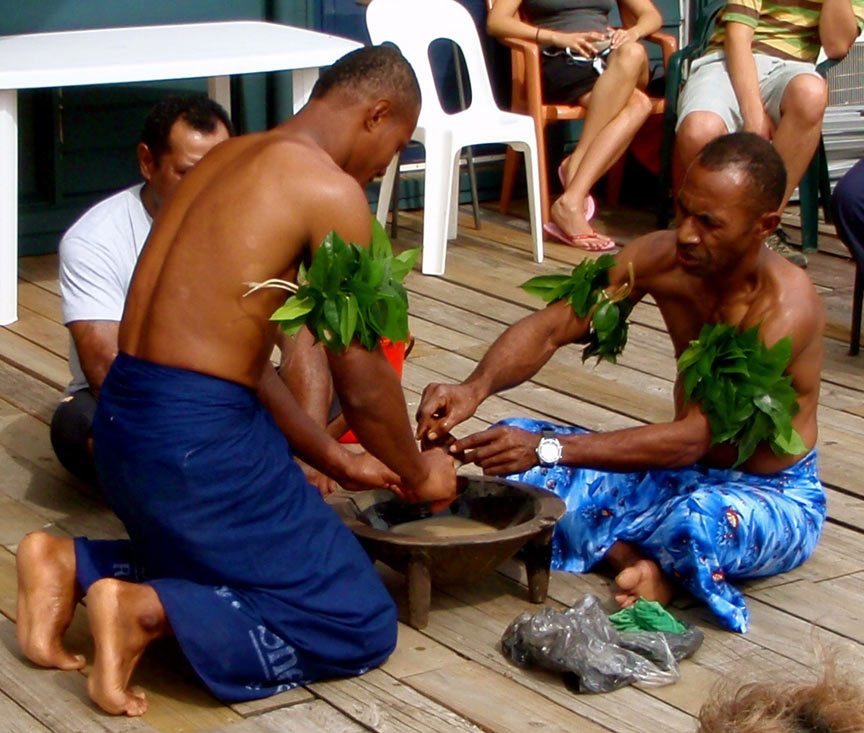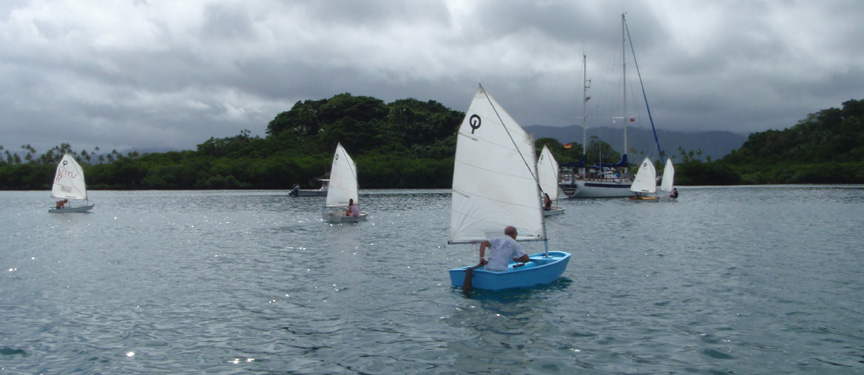Savusavu, Vanua Levu Island, Fiji

Harmonie
Don and Anne Myers
Sun 12 Jul 2009 01:24
|
16:46.616S 179:20.227E
We arrived in Fiji on June 25th and stayed in the
cozy Savusavu harbor for about a week before heading off to other less developed
bays and islands with Lady Kay and Storyteller. There are two large
islands in Fiji; Vanua Levu (where we are now) and to the southwest, the
slightly larger Viti Levu. These two main islands are surrounded by more
than 300 smaller islands and countless reefs. The total population
of Fiji is 836,000, but the real story is the mix of people.
As reported last year in the blog:
'In the late 1800's, thousands of Indian indentured
servants were brought to Fiji to work the sugar plantations. In 1970, Fiji
became an independent nation and British rule ended. By that time, many of
the Europeans had left, but the Indians stayed - after all Fiji was truly their
home by then. Native Fijians ruled until the national elections of April
1987, when a coalition of parties composed predominantly of Indians won.
As you might imagine, the Indians and the Fijians didn't always play well
together and since 1987, there has been strife in Fiji and several military
coups took place which put native Fijians back in power. The political
situation is still somewhat unsettled. The population remains about 50%
native Fijian and 50% Indian, although it is said that the Indian
population is decreasing as some Indians are choosing to leave Fiji.
Most of the Indians live in the urban centers and near the sugarcane
production areas on the two main islands, while the native Fijians
live in the urban centers and throughout the whole of Fiji on the hundreds
of islands.'
All still true, but the political strife saga
continues as yet another military coup happened earlier this year before we
arrived. From what we have seen so far, the country appears to be stable
and the people happy enough. In Savusavu, the mix of native Fijians and
Indo-Fijians (Indians) makes for a very unique atmosphere. One stroll down
main street is all you need to get an appreciation for the culture
mix. Bollywood and traditional Pacific music blares from stores
that carry a mishmash of products. The office supply store (term
used very loosely) also offers local frozen meat and homemade fishing
lures. The store a few doors down offers sulus
(sarongs) and saris made to order in one day. The Indo-Fijian marina
manager, Dolly, recommended a transvestite Polynesian hairdresser
named Reggie for haircuts and color. Jackie, Sue and I visited Reggie
and found him/her to be extremely gracious and talkative, as well as very large
and extremely decked-out in a multi-colored turban, full make-up and colorful
dress. If we didn't know she was a he, we never would have
guessed. We were there the day the news about Michael Jackson's and
Farah Fawcett's deaths broke in Fiji. Reggie was devastated on both
counts. At any rate, the atmosphere around town is higher energy than
anything we experienced in Tonga, and we can't help thinking that the underlying
buzz we feel when walking around is mostly due to the
Indo-Fijians and not so much the native Fijians.
Curry is big here. Very big. Served up
in every bar, restaurant and cafe. Eaten by boaters, Indo-Fijians,
tourists and native Fijians alike. The local market is crammed with stalls
(tables) manned by Fijians and Indo-Fijians. There's even an Indo-Fijian
that sells kava. So although there may be political strife going on
between the Indo-Fijians and the Fijians, it's not something you would
notice on the streets. Both cultures appear to co-exist in harmony,
but it's clear that they co-exist and don't necessarily inter-mix.
Inter-racial marriages are extremely rare and the two cultures appear
to socialize separately. From what we've read, it seems the political
unrest stems from the land ownership laws and lack of Indo-Fijian political
power. For the most part, Fijians own all the land.
Indo-Fijians rent land for their plantations and businesses from the
Fijians via long-term leases, but by law, the land belongs to the native Fijians
and it can't be sold. Every time the Indo-Fijians win a political battle
and gain more rights and/or power, the native Fijians start to get nervous that
the land ownership laws may change. This is usually about when a
military coup takes place and the political power pendulum swings back to the
Fijians. And so it goes in a South Pacific third world island
nation.
Ok, so back to Savusavu and our first week
here.
As usual, there were a couple rally events to
celebrate our arrival in Fiji and an array of happy hours and dinners out with
fellow boaters. Have I mentioned the strength of the US dollar in
Fiji? Another benefit of the recent coup - the Fijian currency
was devalued against just about all other currencies, so food, services, etc.
are extremely cheap. $5 US for a haircut from Reggie, if you have
connections, a pedicure from one of the local Fijian girls in a room above the
marina is $7 US, a three course meal with lots of wine for two at
a nice restaurant for $40 US, and a dinner for six including four bottles
of Australian wine at the best Chinese restaurant for $80 US. How can you
go wrong? Speaking of the Chinese restaurant...the young chef
left the kitchen after all the dinners were served and amused himself in the
dining area by playing joke music on the stereo. My personal favorite was
'Cat's in the Kettle' set to the tune of 'Cat's in the Cradle' as performed
by Cat Stevens (as in, 'And the cat's in the cradle and the silver
spoon....Little boy blue and the man on the moon....When you comin'
home dad? I don't know when, but we'll get together
then....') When I asked the young Chinese chef why he was
playing a song about cooking cats in the dining area of his own Chinese
restaurant, he grinned and said simply, 'It's just for fun!' Let's hope
so.
We were happy to hear about one change brought on
by the recent coup though...apparently the entire cookie-eating, bribe-taking
customs/health/quarantine/immigration staff in Fiji's Lautoka port was
canned and replaced. We can only hope that the new staff is kinder to
boaters. We'll find out since we have to check in and out of every major
port in Fiji before we are allowed to cruise to the more remote islands in each
area. So far in the two weeks we've been traveling around Fiji, we've
checked in to Savusavu, out of Savusavu and back in to Savusavu. Before we
are done, we'll check out of Savusavu, in to Lautoka and out of Lautoka.
This checking in and out thing is almost as bad as crossing what is supposed to
be the international dateline in Fiji. 180 degrees longitude runs right
through Vanua Levu and neighboring Taveuni Island. In our recent travels,
we've crossed it three times. Lucky for us the dateline is diverted to the
east of Tonga so we didn't have to time travel each time we crossed. I can
report that the glowing dotted blue line definitely does not exist. Sad,
but true. We most certainly would have seen it by now after crossing
180 degrees once last year and four times this year.
On with the pictures:
Picture 1 - This was our view from the first
mooring we had in Savusavu harbor. We were at the far end of the mooring
field and got to gaze at these mist covered mountains every day. Fijians
who don't have the money for a 'proper' Fijian boat or outboard motor, travel by
bamboo raft. Presumably, this group was heading home to their village
after a day in Savusavu.
Picture 2 - The marina and rally managers arranged
for an official kava ceremony welcome for us rally boaters. Sue, Jackie
and myself attended in proper attire - long skirts and long-sleeved
shirts with knees and elbows covered.
Picture 3 - Fijians literally hand-preparing the
kava.
Picture 4 - Brave Don going for a coconut bowl full
of double strength kava. He was particularly mellow later on that
afternoon.
Picture 5 - Dancing girls. After the kava
welcome ceremony, we were treated to dancing by this troop. The girl in
the front with the long hair seemed to be the leader of the group and knew the
dance moves well. The other three girls managed to get through each number
only by watching the lead girl. Later we decided the lead girl was the daughter
of the dancing troop's teacher. Aha! No wonder she was so
good.
Picture 6 - After the dancing, the rally challenged
the local kid's sailing club to a race using the sailing club's sailing
dinghies. It was four kids in four sailing dinghies vs. four adult (with
one exception) rally sailors in another four sailing dinghies. John from
Storyteller, known for his racing expertise, volunteered to be one of the rally
representatives in the race. Although the rally representatives were
soundly beaten by the local kids, John was our best performer, and in the second
round managed to beat at least one (or was it two?) of the kids as well as all
the other rally representatives. That's John in the blue dinghy
formulating his racing strategy as he stares intently ahead.
Pictures 7 and 8 - A group of rally boaters went on
a bus tour to the local rainforest preserve. It was a beautiful
spot with a nice hiking path through the rainforest - all set up
with money from a New Zealand environmental aid agency. The first
picture shows the wife of one of the rainforest caretakers setting out
information under a traditional Fijian bure structure. The second picture
is a view of the rainforest. Getting to the rainforest and back was almost
more exciting than the rainforest itself given the seen-better-days bus and the
driver's extreme difficulty getting the thing to shift gears on the steep
inclines. It wasn't as exciting as our tourist truck ride to see the
volcano in Vanuatu though, that one still reigns supreme in the area of
take-your-life-in-your-hands tourist transportation.
The rest of our first week in Savusavu was spent on
boat maintenance and cleaning, restocking of supplies (translation: we were
low on beer) and waiting for a spell of rain to pass before normal wind patterns
re-established themselves allowing us to start our tour of the
southeast and east coast of Vanua Levu and Rambi Island. However,
before we left Savusavu, we did take the time to celebrate two things
simultaneously: our 13th wedding anniversary and our newly refitted, fully
operational grill. Sue and Grant, friends of Sue and John's, flew in from
New Zealand to join Storyteller in Fiji for ten days, and along with the bits
and pieces they hauled to Fiji for Storyteller, they also brought the
necessary parts to resuscitate our grill from the land of the living
dead. We dug out the New Zealand champagne and the frozen New Zealand lamb
chops we had been saving for just such an occasion and toasted both
accomplishments (each of equal importance) - 13 years and a refurbished
grill.
Anne |







